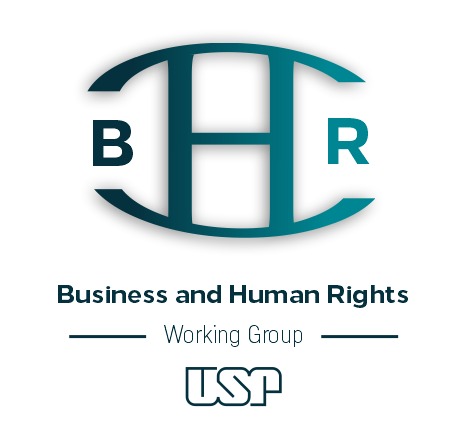USP Business & Human Rights Working Group
USP Business & Human Rights Working Group

(to be completed)
Meta-regulatory initiatives in Brazil and Portugal
Corruption, Human Rights, and Sustainable Development
Beyond Corruption: How to foster human rights protection through anti- corruption regulation in developing economies
The panel aims to promote discussions about new emerging trends in regulatory governance that can effectively foster human rights’ protection through the network of anti-corruption regulatory policies in developing economies. Despite having drawn scholarly attention worldwide, studies in the field still demand better metrics and innovative solutions to go beyond the common sense of fighting corruption. Globally, the current legal and regulatory framework of anti-corruption is mainly focused on enhancing governance, risk avoidance, and compliance measures to prevent corruption. There is still nothing much in the field about the possible links between corruption, democracy, and human rights.
Whereas the adverse effect of corruption on human rights is easy to relate – but hard to measure –, the possible impact of anti-corruption regulation on human rights, whether fostering or hindering its protection, is open to debate. Especially concerning developing economies, consistent data that analyze their regulatory strategies, or the impact generated by their regulatory policies are scarce.
The connection between the lack of human rights protection and corruption is evident in developing countries, where modern forms of systemic corruption – far beyond the common sense of quid pro quo bribery of public officials – are somehow prevalent. Missing are, though, reliable measures on the relationship between corruption, inequality, poverty, and development that could impact, more or less severely, human rights violations. On the one hand, this missing account affects the government’s capacity for formulating public policies and funding essential services, as a consequence undercutting public health services, causing social inequality, and aggravating poverty. Moreover, corruption causes market inefficiencies and distorts the economy, and undermines the rule of law. On the other, the weak regulatory ambiance is combined with unstable institutions and harsh enforcement measures, generating cascading effects over human rights violations. It is not surprising that in the last fifty years developing economies are facing the “judicialization of politics” through corruption scandals.
In Latin-America, for instance, the regulatory landscape, notwithstanding increasingly complex and sometimes imbricate, presents some frailties that seem hard to overcome, evidencing a combination of an increased sense of lawlessness and economic precariousness with an ever-increasing repressive orientation of large enforcement operations, such as the so-called Car Wash Operation. The wave of anti-corruption regulatory reform throughout Latin-America only apparently suggests the strengthening of regulatory enforcement, such as significant advances regarding asset recovery, and law enforcement authorities’ international cooperation. In the private sector, the problems are internally addressed in the corporate field, justifying corporate expenditures to enhance the design, the implementation, and the integrity content of business management. Despite this, those countries are facing the raise of authoritarian trends and a kind of moral fanaticism concerning the fight against corruption, typically labeling and creating folk devils that justify the use of criminal sanctions against selected high ranked managers and politicians. There is not only lack of evidence of the deterrent effect coming from this recent movement, but also insufficient means and alternative strategies to hold accountable companies pivotal to the corruption schemes.
Corruption remains an evolving concept. Corruption, human rights, and democracy without a clear and objective interactive regime are no more than loose pieces of a puzzle.
Conversely, on 25 September 2015, the United Nations General Assembly adopted 17 Sustainable Development Goals (SDGs) with 169 targets as part of an overarching global 2030 Agenda for Sustainable Development. With a transversal human rights approach, the 2030 Agenda, through the SDGs, encompasses a myriad of subjects, ranging from addressing social inclusion, poverty, hunger, employment, education, gender equality, to the protection and sustainable use of several resources, climate change, among others.
The 2030 Agenda acknowledges the necessity of building peaceful, just and inclusive societies that provide equal access to justice and that are based on respect for human rights. SDG 16, in particular, seeks to “[p]romote peaceful and inclusive societies for sustainable development, provide access to justice for all and build effective, accountable and inclusive institutions at all levels.” Its target 16.5 aims at “[s]ubstantially reduce corruption and bribery in all their forms.”
The decentered nature of the global regulatory environment encompasses different suppliers of regulation as rule-makers besides the state. It is also polycentric, with diverse centers of decision-making coexisting independent from each other. In this scenario, it has been argued that among the various new governance regulatory arrangements partnerships are capable to foster sustainable development. SDG 17, devoted to means to implement the goals, has 2 targets aiming at developing and strengthening partnerships. More precisely, target 17.17 aims at fostering “effective public, public-private and civil society partnerships, building on the experience and resourcing strategies of partnerships.”
In this regard, different collective action initiatives designed to prevent corruption have been put in place. However, several questions remain open to debate, such as what drives the engagement of the different stakeholders; how to foster trust among the group members; how to grant the sustainability of the initiatives through time; and, by considering effectiveness whether the initiative has fulfilled the goal to which it was designed, which elements can have impacted positively to achieving the final objective.
In light of the considerations mentioned above, this research seeks to explore possible examples of failures and success of anti-corruption regulation in developing economies and how they correlate with the protection of human rights. We strongly incentivize empirical work and papers that address possible networks of governance and international cooperation that could help foster human rights employing anti-corruption regulation. Therefore, the investigation can focus on, but not limited to:
- Theoretical or empirical research on the possible impact of anti-corruption regulation on human rights;
- Studies on the relationship between corruption, inequality, poverty, and development that could impact human rights violations, with a connection to regulatory governance or regulation;
- Evidence of the deterrent effect, or its deficit, resulting from strengthening the enforcement of anti-corruption regulation, as well as means and alternative strategies to hold accountable companies pivotal to the corruption scandals;
- Interdisciplinary approaches to address the complexity of both corruption and anti-corruption regulation;
- Studies on SDG targets 16.5 and 17.17, but regarding target 17.17, related or impacting corruption reduction;
- Theoretical and empirical approaches to collective action initiatives designed to prevent corruption.

 Imprimir
Imprimir